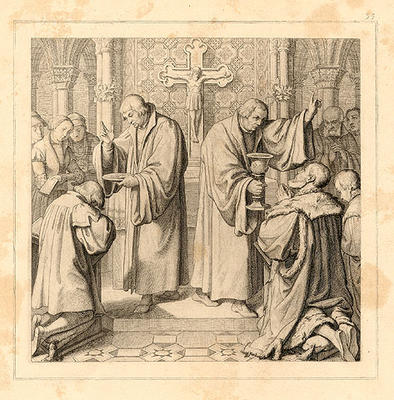Desire for the Lord’s Supper
Q: Maybe you can help me understand why some churches do not believe in taking communion, at least not very often. I believe this mostly comes from Pentecostal or nondenominational churches, but I wonder what the theory is behind this.
A: Some people have a hard time believing that God works through means (such as water, bread, or wine). They usually also have a low view of the Pastoral Office, regarding it not as Gospel blessing of our Lord and a conveyance or channel of God’s grace. They think that “direct contact” with God by individual Bible study and prayer is to be preferred to corporate participation and reception. This is especially true with those who believe that the Lord’s Supper is only a memorial meal or some sort of vague “spiritual” eating and drinking of Christ’s body and blood. They can “remember” Him and receive Him spiritually without actually eating and drinking.
Actually, not only the Pentecostals, but all churches who deny the clear words of Christ concerning His Supper tend to offer it infrequently. This includes those who descend from the Radical Reformers (including the Anabaptists) of Luther’s day, those who follow the teachings of John Calvin, and the spiritual heirs of Arminius and Wesley.
If the bread and wine truly are His body and blood, as Matthew, Mark, Luke, and Paul plainly state and Luther clearly confessed, then desire to receive regularly Christ in His Sacrament is much more likely. After all, if you truly crave “direct” contact with God, what is more intimate than handling, eating, and drinking the body and blood of the God-man Jesus Christ?
 Still, even though Christ says, “This is my body … this is my blood” — and while the Bible records it and faithful Lutherans confess it — many in this day still suffer from “the deplorable, miserable condition” which Luther notes in the Preface to the Small Catechism:
Still, even though Christ says, “This is my body … this is my blood” — and while the Bible records it and faithful Lutherans confess it — many in this day still suffer from “the deplorable, miserable condition” which Luther notes in the Preface to the Small Catechism:Since the tyranny of the Pope has been abolished, people are no longer willing to go to the Sacrament and despise it [as something useless and unnecessary]. Here again urging is necessary, however, with this understanding: We are to force no one to believe, or to receive the Sacrament, nor fix any law, nor time, nor place for it, but are to preach in such a manner that of their own accord, without our law, they will urge themselves and, as it were, compel us pastors to administer the Sacrament.
This is done by telling them: Whoever does not seek or desire the Sacrament at least some four times a year, it is to be feared that he despises the Sacrament and is no Christian, just as he is no Christian who does not believe or hear the Gospel; for Christ did not say, This omit, or, This despise, but, This do ye, as oft as ye drink it, etc. Verily, He wants it done, and not entirely neglected and despised. This do ye, He says.
Now, whoever does not highly value the Sacrament thereby shows that he has no sin, no flesh, no devil, no world, no death, no danger, no hell; that is, he does not believe any such things, although he is in them over head and ears and is doubly the devil’s own.
On the other hand, he needs no grace, life, Paradise, heaven, Christ, God, nor anything good. For if he believed that he had so much that is evil, and needed so much that is good, he would not thus neglect the Sacrament, by which such evil is remedied and so much good is bestowed. Neither will it be necessary to force him to the Sacrament by any law, but he will come running and racing of his own accord, will force himself and urge you that you must give him the Sacrament.
Thus we see that even when the gift is offered with great frequency, many refuse to accept it.
Scripture quoted from The Holy Bible, English Standard Version™, © 2001 by Crossway Bibles.
Small Catechism quoted from The Book of Concord online.
Send email to Ask the Pastor.
Walter Snyder is the pastor of Holy Cross Lutheran Church, Emma, Missouri and coauthor of the book What Do Lutherans Believe.

0 Comments:
Post a Comment
<< Home